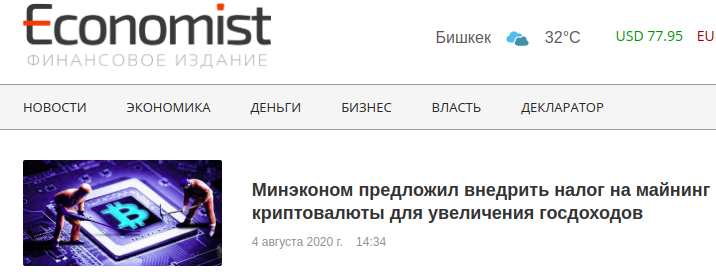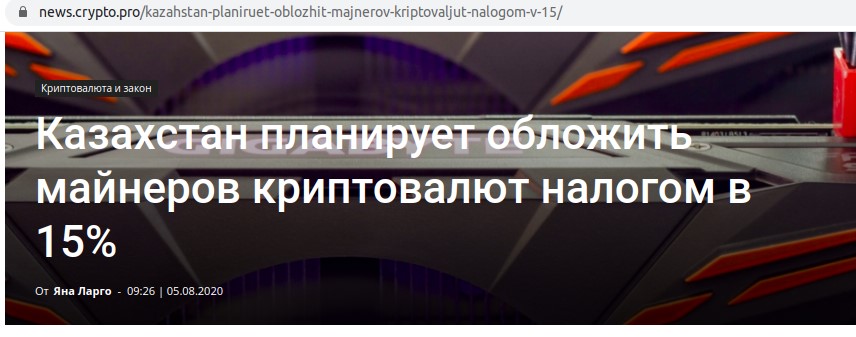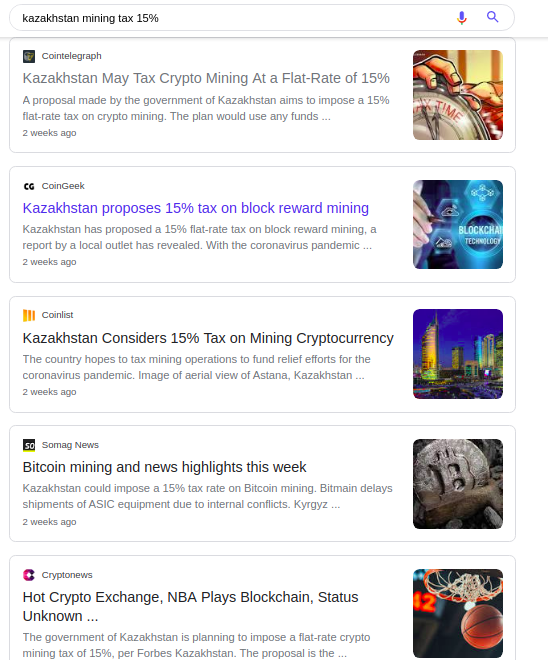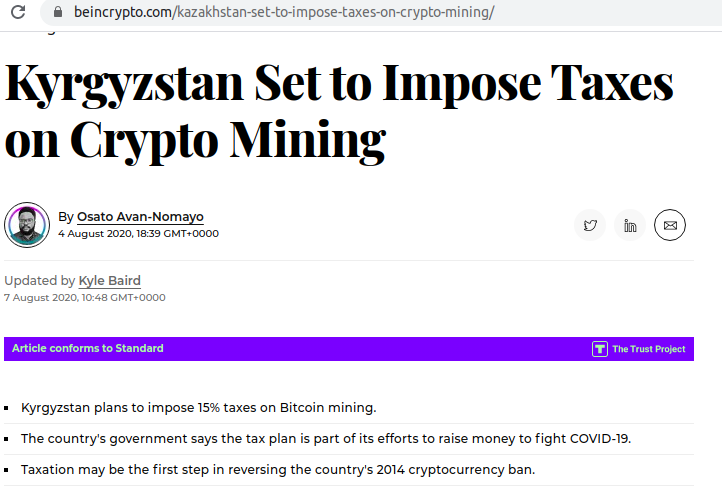News


The short news piece proceeds to say that the Ministry of Economics of Kyrgyzstan has published a preliminary text of a new mining tax law, which can be viewed at the Ministry's website. The authors of the law stress that Article 61 of the country's tax code already makes a provision for such a law, so there's nothing particularly unexpected about it.
The mining tax is supposed to bring in some much-needed cash to the Kyrgyz government. The country is experiencing its worst GDP decline in 25 years.
If the law is passed, mining farms will pay a special tax instead of the profit tax, sales tax and VAT that they are now paying. The new tax will be calculated based on how much electric energy the mining farm consumes (including the VAT and the sales tax), and the proposed rate is 15%.
By the way, starting from July 1, 2020, there is a special electricity price rate for mining farms operating in Kyrgyzstan. They'll have to pay 2.91 som ($0.037) for each kilowatt hour. This change has little to do with the coronavirus, however: the new pricing policy was approved back in March.
HOW DID KYRGYZSTAN TURN INTO KAZAKHSTAN?
The news published on economist.kg would've never attracted the attention of Bitcoin.com and Cointelegraph if it wasn't for the major Russian crypto site Crypto.pro. This is where the mistake originates:

It's hard to understand how the journalist managed to get the country wrong. You could understand if a US author mixed up Kazakhstan and Kyrgyzstan – after all, hardly anyone in the West knows where Kyrgyzstan is. But coming from a Russian columnist, this is really a glaring – and unexplainable – error. After all, 640 thousand Kyrgyz nationals live and work in Russia.
It gets worse, though. The Crypto.pro description of the tax proposal itself is also wrong. The article makes it look like miners will have to pay 15% of what they earn, as a sort of a mining revenue tax. In fact, as we've seen, it's 15% of the electricity bill.
The article was soon reprinted by Forbes.kz in their daily feature 'What foreign media write about Kazakhstan'. This way, even those international websites that didn't notice the publication on Crypto.pro eventually got the news from Forbes.
THE FAKE NEWS GOES GLOBAL
Starting from August 6, the news was picked up by international crypto portals, such as Cointelegraph, Bitcoin.com, and CoinGeek. They mostly translated what Crypto.pro had said, adding background details about crypto mining in Kazakhstan to flesh out the piece.

All this additional info about Kazakh investments in mining, hashrate, and Covid-19 deaths in Kazakhstan made it even worse, lending more credibility to what was essentially fake news.
Curiously, Cointelegraph points out that the new mining tax goes against the Kazakhstan authorities' earlier promises not to tax mining:

Google search returns 17,000 news results for 'Kazakhstan mining tax 15%':

Xive cryptocurrency mining company is based in Kazakhstan, so you can understand why we were not happy to see this sort of misleading information spread around the globe. After all, Kazakhstan remains one of the cheapest mining destinations in the world – and there are no plans to tax mining revenues.
CAN WE FIX THIS?
We reached out to two media outlets (BeInCrypto and Decrypto), pointing out the mistake. Both did correct the title - but not the URL. As you can see from the screenshot, the URL still says https://beincrypto.com/kazakhstan-set-to-impose-taxes-on-crypto-mining/.

Of course, Cointelegraph, Bitcoin.com and others aren't to blame here. They relied on (presumably) trustworthy sources: Crypto.pro and Forbes. The responsibility lies with these latter Russian-language websites.
How does one confuse two countries that are both so tightly linked to Russia and constantly on the news radar? How can a journalist be so negligent as to look at a headline that clearly says 'Kyrgyzstan' and write 'Kazakhstan' instead?
This is a lesson to all content writers out there. Information is easily corrupted when it's passed from one website to another. So don't use second-hand data: always go back to the original source.
We hope that this blog post will clarify things and maybe even cause a few of the news outlets to correct their articles. Please share or repost – let's fight fake news together!